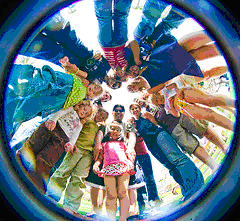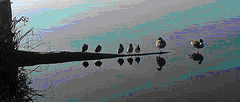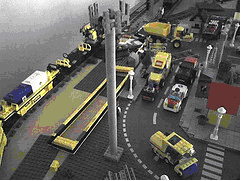April 2010
The Age of Oblivion
Neptune and Chiron are inching forward in the sky throughout April, slowly separating from their conjunction in February. They remain neck and neck all year, which indicates that they still have a job to do; and they’re doing it at the same celestial location: around 26 Aquarius.1
Where does this degree fall in your natal chart? Here is where you are getting glimpses of enlightenment, of a peculiarly modern sort. It’s also where you are vulnerable to the most curious addiction of our age.
Socializing our Pain
I have written elsewhere about Chiron’s association with woundedness, and about Neptune’s with self-loss. When you put the two together in Aquarius (collective interaction), you get a teaching about how we socialize our pain.
The sign Aquarius wants to share ideas. It knows that groups can conjure mental energy in ways that single individuals cannot. And because Neptune universalizes whatever it touches, this transit has been leading us to join the biggest group of all: the human race. It’s given us the urge to merge with the undefined masses across the world.
If the terms of this merger are anonymous, so much the better. Neptune induces us to do a strange disappearing act, whereby we downplay our identity in interactions; as if we were a blacked-out silhouette in a witness protection interview.
Or a username in an online conversation.
Cosmic Pun
Neptune lures us to escape from individuality, which is pretty much the opposite of what we say we want. This is why its transits are so confusing. Our conscious self values and promotes our uniqueness, whereas the unconscious part of our self represented by Neptune feels uniqueness to be a burden and a trap.
So what do we get with this planet in this sign? Depending on the awareness with which we wield it, the transit shows up either as a longing to escape (shadow Neptune) into the group mind (Aquarius), or as the inspiration to plunge into spiritual union with it (fully realized Neptune).
Chiron’s role in the conjunction brings out the hardships of being human, which the transit suggests can be resolved by diving like a raindrop into the great ever-shifting sea of human communication.
This symbolism fits cyber-networking so exactly that it’s like a cosmic pun.
Ego and Soul
There’s been a lot of consciousness-raising during the 12 years Neptune has been in Aquarius. All over the world, people have been led to surrender their ego-selves to compassionate service or spiritual search. They’ve been following a siren call to link up with humanity as a whole.
Others have surrendered to the sprawling mass of ones and zeroes in cyber-space, searching for links of a less exalted nature. Since Neptune entered Aquarius in 1998, digital socializing has exploded into a universal phenomenon.
There is quite a gulf between Neptune at its best and Neptune at its worst. It’s easy to see why, when we factor in cultural conditioning. The very idea of ego-transcendance goes against everything we moderns are raised to do. We’re taught to avoid anything that smacks of self-undermining, a neurosis guaranteed to mess with our career arc, our sexual performance, or our SAT scores.
But Neptune only undermines the individuality in order to give us a vaster frame of reference within which to understand the mystery of identity.
No Shamans
This transit is right on top of the USA’s Moon. Americans have been marinating in it, on a day-in-day-out level. For a society like ours, its message is particularly difficult to assimilate. This is because it’s an explicitly otherworldly transit, and ours is a very worldly society.
Materialist societies give their citizens few frameworks with which to interpret Neptune’s promptings. We have no shamans to translate for us the non-pathological meaning of angst. We barely have philosophers any more: the pundits have replaced them. Nor do we champion the artists, under whose direction we might contact these sublime yearnings. And fat chance of the church lending a hand: contemporary Western religions tend to be far more Saturnine (rule-bound) than Neptunian (mystical).
This leaves the material realm to absorb our existential pain, and it isn’t subtle enough to do so. So the dark side of Neptune (passivity, obliviousness) in Aquarius (technology) has become the transit’s primary expression.
It is not the internet itself that is the problem, of course. Like all game-changing human developments, the internet revolution has provided a context for genuine genius to arise in a million different ways, and has allowed connections between thinkers that would’ve been inconceivable at any other time in human history.2
But in terms of collective spiritual maturation, it has hindered rather than helped us. Our misuse of cyber-communication has created a gaping social emptiness.
Weakness and Passivity
The philosopher Jacob Needleman chalks up the insanity of our times to “the weakness and passivity of our attention.” Astrology sees this as a signature of misapplied Neptune.
Even at its best, this planet will sap our vigor and initiative; and if we don’t use it with spiritual intelligence, it’ll make us tired, restless and zoned out. With the conjunction going back and forth over the Sibly chart’s Moon for several years and counting, the USA is a poster child for this enervation. Distracted and superficial, America’s popular culture, with its dumbed-down media and its indulgence of our quick-fix tastes, reflects back to us the weakness and passivity Needleman is talking about. The cyber-centric lifestyle has swallowed up these expressions of Dark Neptune into a sea of normalcy.
It bears repeating that our unhealthy use of this or any other transit isn’t the planets’ fault, nor is it a “bad” thing in the big picture; it’s just a symptom, one that we can learn from if we pay attention. Chiron’s involvement tells us that the purpose here is healing; and holistic theory tells us that we cannot heal anything – not the flu, not heartache, not spiritual disquiet — until or unless we face the wound at its source.
Our first step is to concede that our society encourages us to cover up our symptoms (take a pill for pain, drink coffee for fatigue, browse the internet to procrastinate). The next step is to distance ourselves from what “everybody else” is doing, and look deeper at our malaise.
A Still Mind
We Westerners have always had trouble understanding what Eastern sages meant when they talked about cultivating a still mind. We are trained to do things. Why should we aspire to just be (whatever that means)? Why take the time out to meditate when the brass ring awaits those who get things done3?
Cyber-multitasking has exaggerated — to a sociopathic degree — our avoidance of self-reflection. Tweeting 4 and texting from morning till night, lost in the ingress and egress of information of ever-more-dubious significance, we keep ourselves in a state of nonstop pseudo-alertness that has diluted our focus to the point of mindlessness. 5
It was Neptune in Aquarius that ushered the acronym ADD into the vernacular. Though officially considered a disorder (which drug companies are more than happy to address), ADD has become so widespread that it is not seen as suspect any more. If “everybody” does it, how can it be unhealthy? Here we’re up against the sneaky codicil of misused Neptune: the blindness of conformity, as when we partake in mass addictions. Once a social phenomenon has become universalized, most people lose the ability to evaluate it critically.
To be a slave to one’s digital machines is no longer the exception but the rule. What’s exceptional is seeing it as slavery.
It is no longer considered rude to yak loudly on a cell phone in a public space, submitting strangers to the details of where you bought your awesome new boots. It is now commonplace for pedestrians to cross the street in front of traffic, the gadgets in their ears making them unable to hear the truck that nearly ran them over. It is de rigeur for the check-out clerk to attend to her cell phone while she does business with the flesh-and-blood customer standing in front of her, attending only partially to either person.
Generation Gap 2.0
The electronic saturation of everyday life feels especially normal to “digital natives”, of course, and especially alarming to oldsters. Many wry jokes have been made by hapless older parents whose children, born with tech savvy in their blood, help us geezers out with our perplexing new machines.
But less thought has been given to the dark side of growing up in a wired world. A recent study found that children average almost 7½ hours a day on various electronic devices (including video games, cell phones, TV and the Internet). There’s plenty of research pointing to a link between this staggering usage and sinking academic performance, in case we needed studies to tell us what we already know from common sense. And as every parent knows, getting kids to curb their usage becomes harder and harder to do as more and more of their peers are raised without such boundaries (dark Neptune).
Perhaps the most troubling aspect of our mass attention disorder is what it is doing to very young children, who depend on creative social interaction during their critical formative years in order to build the social skills they’ll need later in life. These questions arise when we see a toddler stumbling along beside his parent who, instead of communicating with the child about the sights and sounds of the outing, is talking on her cell phone as they walk down the street. In terms of language skills lost and psychological modeling neglected, what will be the repercussions of this child’s missing ongoing interface with his mother? In terms of emotional bonding, what inference will the child draw from the fact that whoever she’s talking to matters more than he does?
What significance will the child draw from the fact that the little piece of polymer attached to his mother’s ear matters more than the here-and-now?
Enmeshed
Our love affair with our gadgets has become, as the psychologists say, enmeshed. We are headed for a crisis, and it may be that texting while driving is the issue that sends us over the edge. Of all our cyber-centric pathologies this one is the most blatant and therefore most likely to get our attention first.
It seems a no-brainer that texting while behind the wheel is unwise to the point of suicidal; but as we know from observing the psychology of substance abuse, addiction does not bow to common sense or even survival instinct. It was only when the fatal statistics starting coming in that laws against texting while driving started to be tentatively introduced.6
Neptune, the key player in this transit, has nothing to do with reason. It governs drowning, whether psychological – as when we drown our sorrows in drink – or intellectual – as when we are so flooded by data from electronic devices that we become oblivious to our immediate environment and everything in it.
What do we do when we’re drowning? We do something to get grounded. Astrology offers the big picture as a grounding device. Its symbolism here is asking us to consider the tech revolution in the larger context of human evolution, and then to recognize our misuses of what is essentially a tool.
A little basic astrology can give us an entrée into the deeper significance of the transit. We know that Aquarius is the sign of friendship, classically defined as a meaningful sharing of ideas that makes us more human. It’s telling to reconsider Plato’s ideal, which stresses the quality of our interactions, and contrast it with the phenomenon of cyber-friending, with its emphasis on the quantity of our interactions. Thinking about this contrast with an open heart will get us into the Chiron part of the transit: a teaching about the pain of disconnectedness.
Chironic work is not for everybody. But it is the key to turning this strangely soulless period into one of transcendent understanding.
_________________________
Notes
1 This is where they were at the Super Conjunction of 2009 (which featured Chiron, Neptune and Jupiter); and at the exact conjunction between Chiron and Neptune in 2/16-17/10. Chiron will dip its toe into Pisces in April 2010, only to go retrograde and re-enter Aquarius in July. When it goes direct again in November 2010, it will do so at the same degree: 26 Aquarius.
2 Many astrologers connect the personal-computer explosion with the Uranus and Neptune conjunction of 1993, a once-in-171-year event.
3 Study after study has shown, however, that even worldly achievements – e.g. those aspired to by business folk and competitive athletes — are easier for those who meditate; because it teaches them how to concentrate. Focus is focus, no matter what its object.
4 The tweeting phenomenon can be seen as having crossed over from marginal fad to mainstream activity when it was first tried — on the air!– by celebrity everywoman Oprah Winfrey. This milestone was reached on April 17th, 2009, five weeks before the first hit of the Aquarius conjunction of Jupiter, Chiron and Neptune.
5 Our social pace has gotten so frenetic that a backlash against it was bound to arise. Thus, the popularity of yoga, eco-tourism, the slow food movement… we might call this whole balancing trajectory the Slow Living Movement.
6 It would be naïve to ignore the billions of telecommunications industry dollars that depend upon customers not thinking about these things too carefully. Consider the studies that link cell phone radiation to cancer: the German research on this goes all-but-unreported in the USA.




